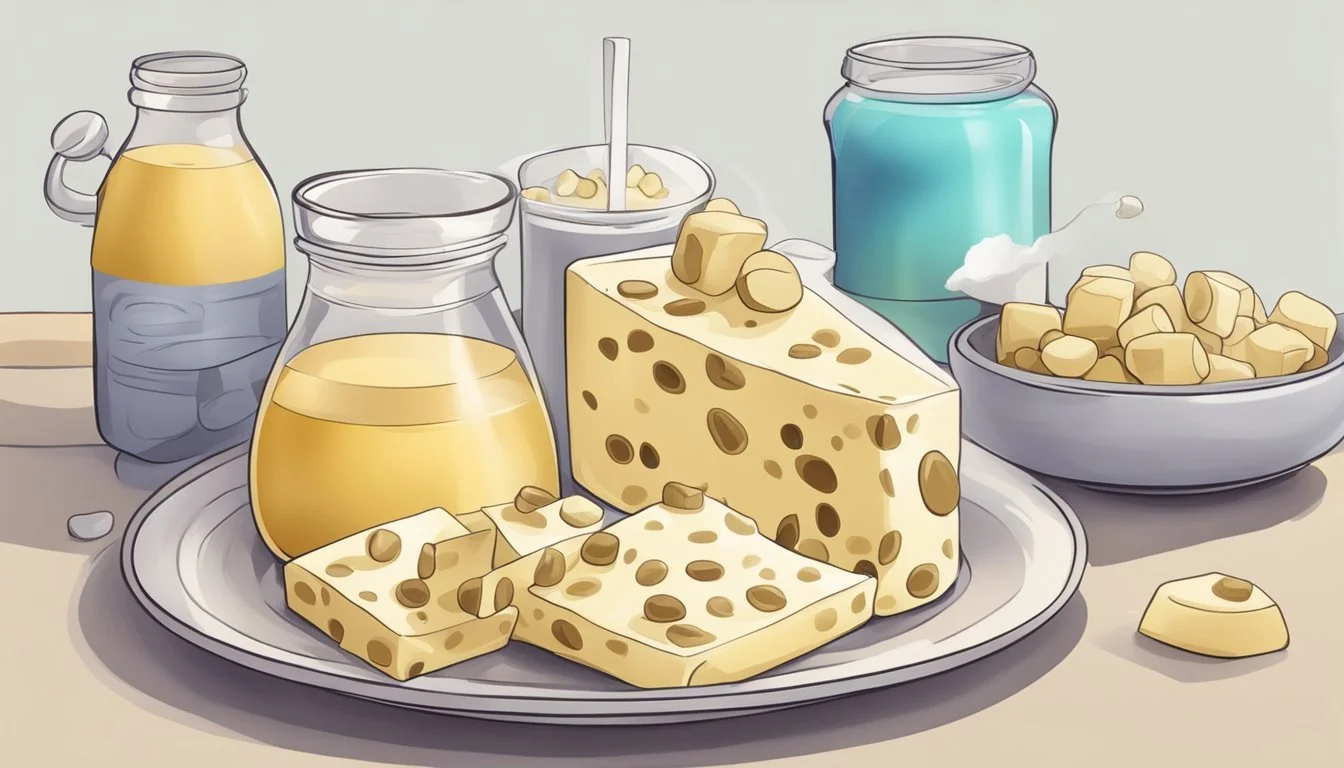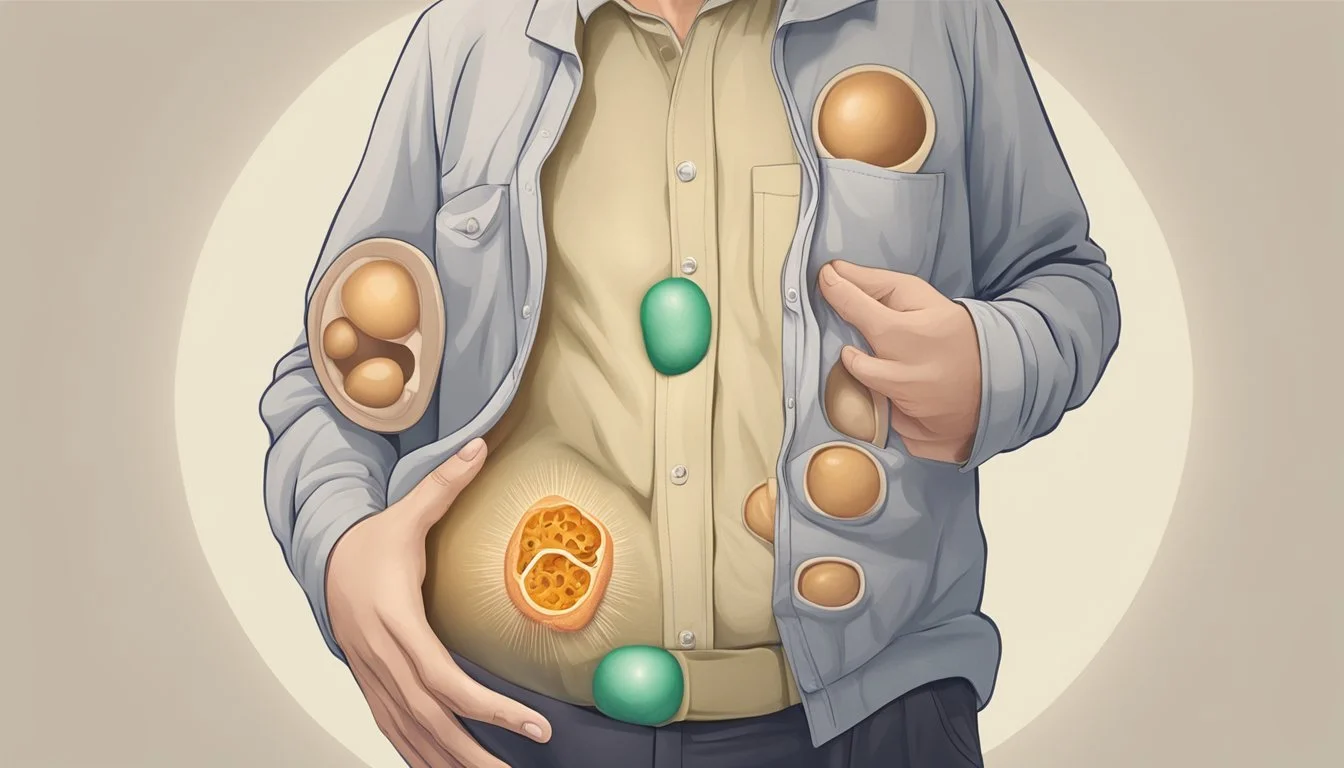Can Lactose Intolerance Cause Kidney Stones?
Exploring the Connection
Lactose intolerance is a common condition characterized by the body's inability to fully digest lactose, the sugar found in milk and dairy products. Individuals with this condition may experience gastrointestinal discomfort such as bloating, gas, and diarrhea after the consumption of dairy. This intolerance arises from a deficiency of lactase, an enzyme required to break down lactose in the digestive system.
The question of whether lactose intolerance can cause kidney stones is intriguing, as diet plays a significant role in kidney stone formation. Kidney stones are hard mineral deposits that form inside the kidneys and may cause severe pain and other symptoms when passed through the urinary tract. The development of kidney stones is influenced by a variety of dietary factors, including calcium intake.
While dairy products are a major source of calcium—a mineral that can bind to oxalate, diminishing the risk of certain types of kidney stones—it is important to note that lactose intolerance itself does not directly cause kidney stones. Rather, the dietary choices and nutritional management of lactose intolerance can have implications for stone formation. Individuals with lactose intolerance often seek alternative sources of calcium, and careful dietary planning is crucial to ensuring adequate calcium intake while minimizing the risk of kidney stones.
Understanding Lactose Intolerance
Lactose intolerance is a common digestive issue where the body exhibits adverse reactions to dairy due to enzyme insufficiency. This section explores what this condition is, its symptoms, and how it affects dairy consumption.
Defining Lactose Intolerance
Lactose intolerance occurs when the small intestine does not produce enough lactase, an enzyme essential for breaking down lactose, the sugar found in milk and dairy products. When lactose is not properly digested, it results in a condition called lactose malabsorption, leading to various gastrointestinal symptoms. Unlike a milk allergy, which involves the immune system, lactose intolerance is a non-immune reaction to dairy sugar.
Symptoms of Lactose Intolerance
Individuals with lactose intolerance typically experience a range of discomforts within a few hours after consuming dairy. Common symptoms include:
Diarrhea: Loose, watery stools shortly after dairy consumption.
Gas: Increased flatulence due to fermentation of undigested lactose in the colon.
Bloating: A feeling of fullness or swelling in the abdominal area.
Abdominal Pain: Cramps or pain in the stomach region.
Nausea: A feeling of sickness that may lead to vomiting.
The severity of these symptoms can vary based on the amount of lactose ingested and the individual's level of intolerance.
Dairy and Dietary Implications
The relationship between lactose intolerance and the consumption of dairy products like milk, cheese, and ice cream is significant, as these are the primary sources of lactose. To manage symptoms, people with lactose intolerance may need to reduce or avoid these foods or seek out lactose-free alternatives. Secondary lactose intolerance can develop due to other conditions damaging the small intestine, such as infection, surgery, or chronic diseases, leading to a sudden inability to tolerate dairy.
Kidney Stones Explained
Kidney stones are hard deposits made of minerals and salts that form inside the kidneys. They can affect any part of the urinary tract and may cause pain, infection, or block urine flow.
Types of Kidney Stones
There are several types of kidney stones, each with a distinct composition:
Calcium oxalate stones: The most common form, often due to high oxalate levels in the diet.
Calcium phosphate stones: Typically related to metabolic conditions, such as renal tubular acidosis or hyperparathyroidism.
Uric acid stones: Can form in individuals with a high protein diet or those who have gout.
Struvite stones: Usually associated with urinary tract infections.
Cystine stones: These are rare and tend to run in families with a condition that causes the kidneys to excrete too much of certain amino acids (cystinuria).
Symptoms and Risks of Kidney Stones
The following symptoms may indicate the presence of kidney stones:
Severe pain in the side and back, below the ribs
Pain that radiates to the lower abdomen and groin
Painful urination
Pink, red, or brown urine
Nausea and vomiting
Risk factors contributing to the formation of kidney stones include dehydration, certain diets, obesity, medical conditions, and specific supplements and medications.
Causes of Kidney Stones
Kidney stones form when the balance of water, salts, minerals, and other substances found in urine changes. Key factors include:
Hypercalciuria: High calcium levels in urine increase the risk of calcium stone formation.
Hyperoxaluria: An excessive amount of oxalate in urine can combine with calcium to form stones.
Low urine volume: Concentrated urine can lead to stone formation as a result of dehydration or insufficient fluid intake.
Dietary factors: High intake of sodium, animal protein, and high-oxalate foods can promote stone formation.
Medical conditions: Diseases that affect calcium absorption can lead to the development of kidney stones, such as renal tubular acidosis or inflammatory bowel diseases.
Dietary Considerations and Kidney Stone Formation
Diet plays a critical role in the development of kidney stones, with certain foods and nutrients impacting stone formation. Understanding the interplay between diet and kidney stone formation can help mitigate risks.
The Role of Diet in Kidney Stone Formation
Dietary habits significantly affect the risk of kidney stone formation. High intake of sodium is known to increase calcium concentration in urine, thereby enhancing the risk of stone formation. Conversely, a diet rich in fruits and vegetables can raise the urine pH level, which in turn can help prevent certain types of stones. Protein consumption, particularly from animal sources, should be moderated as it can increase stone risk. Adequate water intake is universally recommended to dilute urinary minerals.
Nutrients Impacts on Kidney Stone Formation Sodium Increases urinary calcium levels Protein May increase risk when high Potassium May help prevent stone formation
Oxalate-Rich Foods and Kidney Stones
Foods high in oxalates, such as spinach, nuts, chocolate, and beans, can contribute to the formation of calcium oxalate kidney stones, the most common type. Oxalates can bind with calcium in the body to form stones; therefore, individuals with a history of oxalate stones may need to limit their intake of oxalate-rich foods.
Oxalate-Rich Foods Comments Spinach High in oxalates Nuts Consume in moderation Chocolate Contains oxalates Beans Watch portion size
Calcium Intake and Absorption
Regarding calcium intake, the relationship with kidney stones is complex. While too much calcium from supplements might increase stone risk, dietary calcium is essential and may actually prevent stone formation as it binds with oxalates in the gut, reducing their absorption. Vitamin D assists with calcium absorption, and its regulation is crucial. Balancing dietary calcium with other nutrients like potassium can be protective, while avoiding excessive salt intake helps manage calcium levels in the urine.
Calcium Intake Recommendations Dietary Calcium Preferred over supplements Calcium Supplement Use cautionary Vitamin D Important for calcium absorption Potassium Balances effects of sodium
Managing these dietary factors, including balancing calcium and oxalate intake, moderating consumption of salts, and ensuring adequate fluid intake, is essential in the prevention and management of kidney stones.
Link Between Lactose Intolerance and Kidney Stones
Lactose intolerance impacts dietary choices that can influence calcium intake, potentially affecting the risk of kidney stone formation.
Evidence and Research Findings
Studies present conflicting views on the relationship between lactose intolerance and kidney stones. Research has shown that individuals with lactose intolerance often consume less dairy, which is a primary source of dietary calcium. Adequate calcium, predominantly from dietary sources, is essential in the prevention of kidney stones, specifically calcium oxalate stones. Calcium binds with oxalate in the intestines, reducing the amount of oxalate being absorbed by the body, therefore decreasing the likelihood of stone formation.
A meta-analysis indicates that diets high in fruits, vegetables, and low-fat dairy products, along with reduced animal proteins and salt content, may lower the risk of kidney stones. It suggests that lactose-intolerant individuals may inadvertently reduce their risk by consuming less animal protein. Yet, the reduced dairy consumption could lead to lower calcium intake unless it is offset with other calcium-rich foods or supplements.
Lactose Intolerance as a Possible Risk Factor
Lactose intolerance may become a risk factor for kidney stones if it leads to inadequate calcium intake. Dairy products are rich in calcium, and their avoidance can result in compensatory mechanisms such as increased intestinal oxalate absorption and subsequent stone formation. Balanced calcium intake is critical:
Daily Recommended Calcium: Adults need about 1,000 mg of calcium per day, which increases for women over 50 and men over 70.
Non-Dairy Calcium Sources: Lactose-intolerant individuals can opt for alternatives such as fortified plant-based milk, leafy greens, and calcium-fortified juices.
Without proper management, lactose intolerance could indirectly increase the risk of kidney stones. However, with careful dietary planning to ensure adequate calcium intake, this risk may be mitigated.
Management Strategies
Effective management of kidney stones involves careful consideration of diet, ensuring adequate calcium intake, and maintaining optimal hydration levels. These strategies are crucial for individuals with lactose intolerance, as they navigate around the traditional dairy sources of calcium.
Dietary Management of Kidney Stones
The dietary approach to managing kidney stones is multifaceted. It is recommended to:
Limit salt intake: Excess salt in the diet can lead to increased calcium in the urine, which can contribute to the formation of kidney stones.
Monitor protein consumption: A high intake of animal protein can increase the risk of kidney stones. Limiting the amount of meat and opting for plant-based sources can be beneficial.
Foods to avoid include those high in oxalates such as certain nuts, chocolates, and leafy greens, which may contribute to the formation of calcium oxalate stones. Including foods rich in citrate, such as lemons and limes, can help prevent stone formation because citrate binds with calcium in the urine, reducing the risk of stone formation.
Alternative Dairy and Calcium Sources
Individuals with lactose intolerance should focus on lactose-free alternatives that are fortified with calcium and vitamin D. These include:
Plant-based milks: Soy milk, almond milk, rice milk, and cashew milk
Other dairy substitutes: Coconut milk, lactose-free yogurts, and cheeses
High-calcium foods: Fortified foods, tofu, broccoli, and oranges
Each alternative source of calcium has a different nutritional profile, so reading labels and ensuring they are enriched with calcium and vitamin D is important.
Hydration and Kidney Stone Prevention
Hydration plays a key role in preventing kidney stones. They are encouraged to:
Drink plenty of water: The primary aim is to keep urine clear or pale yellow, as this dilutes the substances in the urine that lead to stones.
Incorporate beverages with citrate: Beverages like lemonade and other citrus-based drinks can offer some protection against stone formation.
Increasing fluid intake to achieve a urine volume of at least 2 to 2.5 liters per day is generally recommended for stone prevention.
Conclusion
Individuals with lactose intolerance often restrict or eliminate dairy products to avoid gastrointestinal discomfort. However, this can inadvertently result in low calcium intake, which may be a concern for bone health. It is important to seek alternative calcium-rich sources to mitigate this risk. Regarding the formation of kidney stones, sufficient calcium intake from non-dairy sources or lactose-free dairy options is essential as it can help reduce the risk by binding to oxalate in the intestines, a known contributor to stone formation.
Dietary patterns play a crucial role in the management and prevention of kidney stones. A balanced diet with high fruits and vegetables, low in animal proteins, and reduced salt content can significantly influence kidney stone risk. Adequate fluid intake is universally recommended to prevent most types of kidney stones, as staying hydrated helps to dilute the substances in urine that lead to stones.
Health information regarding lactose intolerance should always be clear about the distinction between lactose-free diets and the potential risks associated with inadequate dietary calcium and mineral intake. In summary, individuals with lactose intolerance should be proactive in managing their diet to ensure a well-rounded intake of nutrients while preventing the formation of kidney stones.








